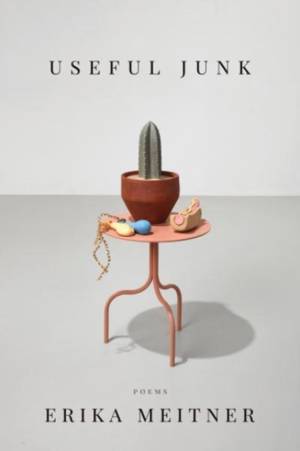
Je cadeautjes zeker op tijd in huis hebben voor de feestdagen? Kom langs in onze winkels en vind het perfecte geschenk!
- Afhalen na 1 uur in een winkel met voorraad
- Gratis thuislevering in België vanaf € 30
- Ruim aanbod met 7 miljoen producten
Je cadeautjes zeker op tijd in huis hebben voor de feestdagen? Kom langs in onze winkels en vind het perfecte geschenk!
- Afhalen na 1 uur in een winkel met voorraad
- Gratis thuislevering in België vanaf € 30
- Ruim aanbod met 7 miljoen producten
Zoeken
Omschrijving
A master of documentary poetry, Erika Meitner takes up the question of desire and intimacy in her latest collection of poems.In her previous five collections of poetry, Erika Meitner has established herself as one of America's most incisive observers, cherished for her remarkable ability to temper catastrophe with tenderness. In her newest collection Useful Junk, Meitner considers what it means to be a sexual being in a world that sees women as invisible-as mothers, customers, passengers, worshippers, wives. These poems render our changing bodies as real and alive, shaped by the sense memories of long-lost lovers and the still thrilling touch of a spouse after years of parenthood, affirming that we are made of every intimate moment we have ever had. Letter poems to a younger poet interspersed throughout the collection question desire itself and how new technologies--Uber, sexting, Instagram--are reframing self-image and shifting the ratios of risk and reward in erotic encounters.With dauntless vulnerability, Meitner travels a world of strip malls, supermarkets, and subway platforms, remaining porous and open to the world, always returning to the intimacies rooted deep within the self as a shout against the dying earth. Boldly affirming that pleasure is a vital form of knowledge, Useful Junk reminds us that our selves are made real and beautiful by our embodied experiences and that our desire is what keeps us alive.
Specificaties
Betrokkenen
- Auteur(s):
- Uitgeverij:
Inhoud
- Aantal bladzijden:
- 104
- Taal:
- Engels
- Reeks:
Eigenschappen
- Productcode (EAN):
- 9781950774531
- Verschijningsdatum:
- 5/04/2022
- Uitvoering:
- Paperback
- Formaat:
- Trade paperback (VS)
- Afmetingen:
- 175 mm x 226 mm
- Gewicht:
- 204 g

Alleen bij Standaard Boekhandel
+ 47 punten op je klantenkaart van Standaard Boekhandel
Beoordelingen
We publiceren alleen reviews die voldoen aan de voorwaarden voor reviews. Bekijk onze voorwaarden voor reviews.









